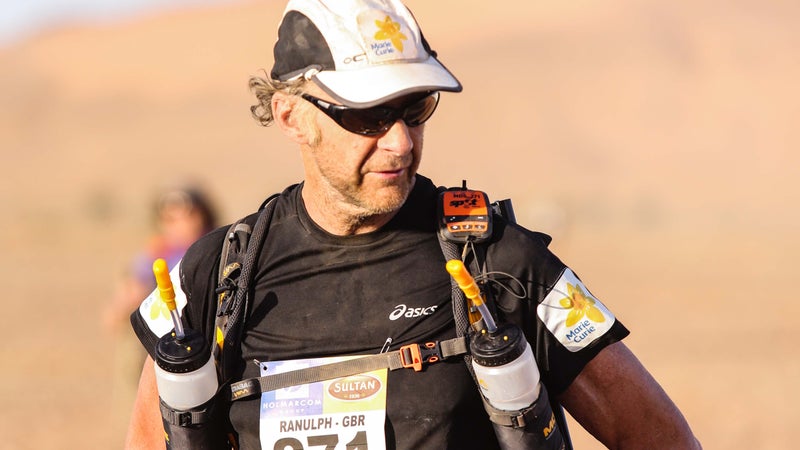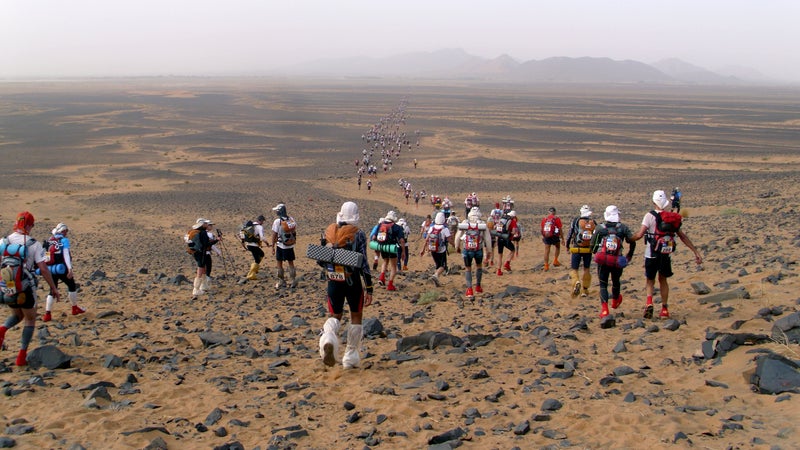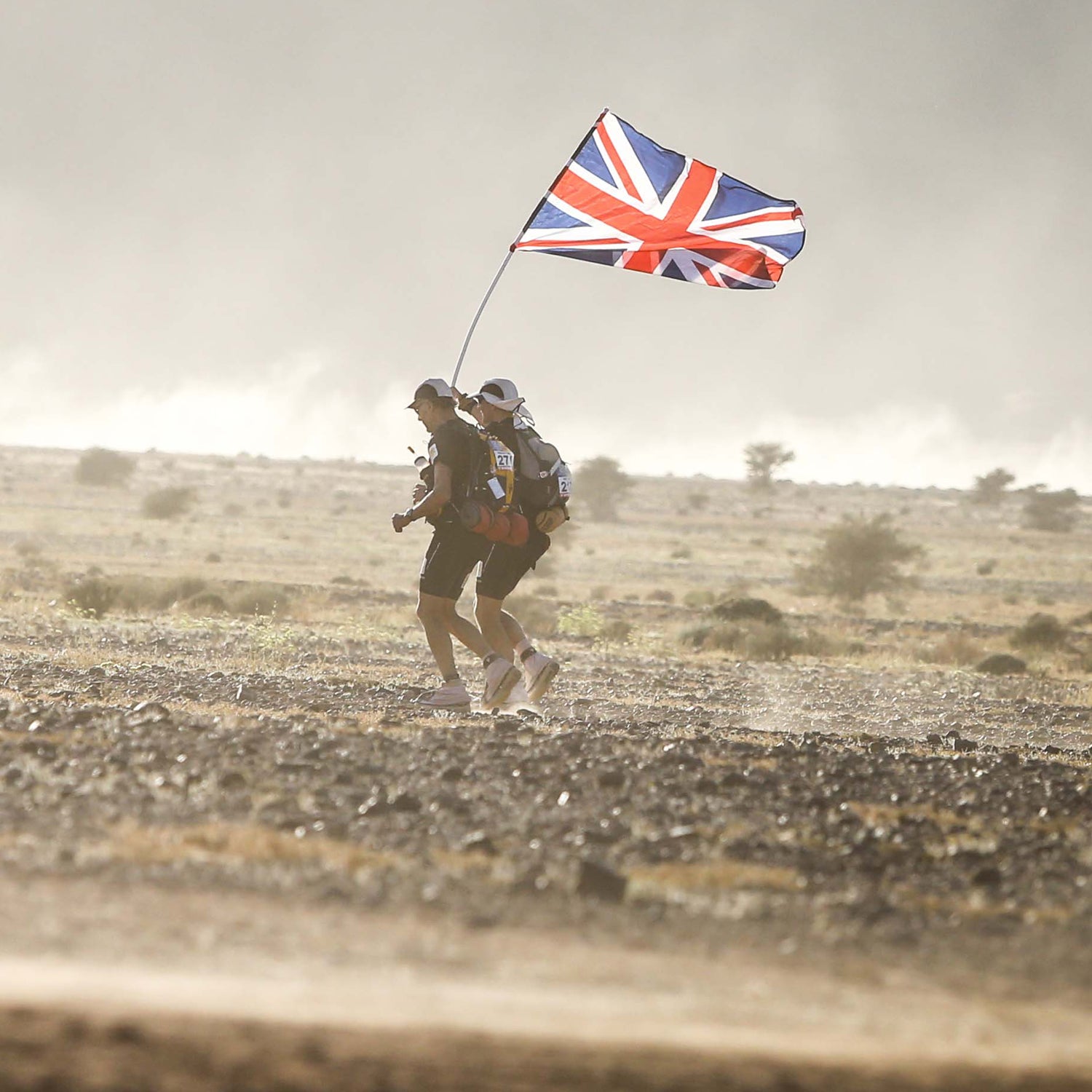“Would you send your elderly grandfather across the desert?” Rory Coleman, Britain’s marathon maestro, asked me this in February as we discussed Sir Ranulph Fiennes’s entry in the . The six-day ultramarathon, which winds 155 miles through the Sahara in southern Morocco, has been called the toughest footrace on Earth. Coleman, a performance coach, holds 11 finishes to his name and has trained over 100 registrants this year, most prominently, Fiennes.
Fiennes, the 71-year-old explorer whom Guinness World Records calls the world’s greatest living explorer, is attempting to become the oldest Brit to complete the race. He is the first person to have reached both poles by surface travel and is the most senior Brit to have summited Mount Everest. He once suffered extreme frostbite on a solo trek across the Arctic and .
“The only thing he hasn’t done is go across a desert,” Coleman said.
Fiennes' participation is in support of , a foundation for terminally ill patients in Britain, for which he’s raising funds. On Sunday, Fiennes toed the start line alongside Coleman and 83-year-old Frenchman Joseph Le Louarn, the most senior finisher of all-time.
���ϳԹ��� chatted with Fiennes about his upcoming ultra, avoiding beauty in the Arctic, and recovering from near-death.
OUTSIDE: In 2003, you . What did you learn from that challenge and how has your training for MDS differed?
SIR RANULPH FIENNES: It’s a fact of life, and it’s a pain in the neck, but it’s called geriatric status. You have to fight very hard to keep going at all. When we did the marathons [in 2003], I could still jog at a reasonable rate. I think back to the days when I could do a reasonable London Marathon in about three and a half hours, and now a marathon seems to take about seven hours. So you can see the big difference. And it could be disastrous during this Marathon des Sables, but I won’t know until I try it. I just want to try and complete it. I do not want to be removed by French helicopters or whatever they have, like vultures, waiting for geriatrics to be removed.

I know you’re a big fan of Sugar Puffs and chocolate, which appear at odds with a runner’s diet. How have you managed this?
In the days when I used to do a lot of ultra stuff, I obviously listened to what the editor of Runner’s World said, “eat lots of pasta.” Everyone ate rice and pasta and was drinking orange juice. Now, it seems that pasta is described as near sugar, and people like me who have pre-diabetes have to steer clear of it. I’m told there’s more sugar in fresh orange juice than Coca Cola. So everything is the opposite of what it used to be. I’ve never been involved with heroin or other drugs, but I can really understand why it’s very hard to give up. I certainly intend to give up [sugar], but my hands get out of control. You know, you’re paying for gasoline and you can’t pay for gasoline without being surrounded by chocolates. I find it very, very difficult to stop.
What gear adjustments have you made for the Marathon des Sables?
I like to wear big spikes or mud claws, but Rory said, “No, in this race you must just use low running shoes.” So, of late, I’ve been slipping and sliding all over the damn place because they don’t grip.
The expansion of air travel in the 1980s and '90s has made remote excursions much more accessible. As you’ve said, “pretty much everybody’s granny” goes to Mount Everest nowadays. How has this changed your approach to expeditions and your perspective on what it means to be an explorer?
I never call myself an explorer, and only one of the expeditions I’ve done in the past forty years has genuinely explored. I call myself on my passport a travel writer or expedition leader, not an explorer. The expedition which did explore was probably the last terrestrial mapmaker—i.e. we were in an area where there were no satellites making maps. When in 1979-1980 we did the first complete one-way crossing of Antarctica, we used Aneroid barometers to map the area from where we spent the winter to the pole. It was about 800 miles, which was unexplored. Nobody had been there, no satellites, nobody knew how high it was above sea level. Nothing was known. We crossed it and mapped it.
“I do not want to be removed by French helicopters or whatever they have, like vultures, waiting for geriatrics to be removed.”
You’ve visited so many nooks and crannies of the world that most people will never visit. What’s the most startling thing you’ve ever seen?
The active volcano in Antarctica, . Seeing the flames and the steam coming out of a place of ice and snow is interesting. We didn’t look for anything other than whiteness. In Antarctica, any beautifulness or wonderful views mean problems. If it’s just white, you won’t get crevasses and that’s good because it means we can continue without problems. In the Arctic Ocean, the same is true, only the ice is on the sea, not on land. Because if you get color, it will mean either that the ice is split or that two million ton ice loads have come together and they create big ice blocks that are difficult to cross. So to get beauty means problems from our point of view.

It can be easy for people to make the excuse that they don’t have enough time to exercise. How do you fit in your runs and plot your day?
I run when my [nine-year-old] daughter is in school. When I’m lecturing, I will take running shoes, and when I get to the hotel, I find out from the reception a local place for an hour’s run. The very worst thing is a hotel gymnasium or a machine. I don’t like them. Now, I’m running about four days a week. If Rory says it’s gotta be more than that, then it will be more, but generally speaking, four one-hour sessions per week. For the last six months, Saturday has become a four-hour jog instead of a one-hour jog.
What do you consider uncovered ground in terms of your explorations?
There’s really only one left, and that’s to cross Antarctica during the polar winter. We have not managed to do that, largely because of the governmental rules, which prohibit UK citizens from traveling down there in winter because there’s no rescue facility on or near the continent during the winter. Therefore, if you run into trouble, you won’t get rescued and will become an embarrassment to your country.
Some people get carted off to nursing homes at your age. You’ve had your own health scares—multiple heart attacks, double bypass surgery, and a cancer operation—not to mention the dangers of your expeditions. What’s motivated you to keep going?
I would consider life not worth living if there weren’t some form of challenge of a physical nature. It’s just what I’ve always done since I can remember, and it would be pointless existing without a challenge


